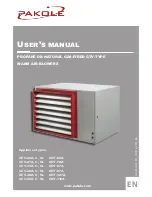
7
5. HEALTH & SAFETY INFORMATION
g) If devices are provided for the connection of dust extraction and collection
facilities, ensure these are connected and properly used.
Use of these devices can
reduce dust-related hazards.
4) Power tool use and care
a) Do not force the power tool. Use the correct power tool for your application.
The
correct power tool will do the job better and safer at the rate for which it was
designed.
b) Do not use the power tool if the switch does not turn it on and off.
Any power tool
that cannot be controlled with the switch is dangerous and must be repaired.
c) Disconnect the plug from the power source and/or battery pack from the power
tool before making any adjustments, changing accessories, or storing power tools.
Such preventive safety measures reduce the risk of starting the power tool
accidentally.
d) Store idle power tools out of the reach of children and do not allow persons
unfamiliar with the power tool or these instructions to operate the power tool.
Power tools are dangerous in the hands of untrained users.
e) Maintain power tools. Check for misalignment or binding of moving parts,
breakage of parts and any other condition that may affect the power tool’s
operation. If damaged, have the power tool repaired before use.
Many accidents
are caused by poorly maintained power tools.
f) Keep cutting tools sharp and clean.
Properly maintained cutting tools with sharp
cutting edges are less likely to bind and are easier to control.
g) Use the power tool, accessories and tool bits etc. in accordance with these
instructions, taking into account the working conditions and the work to be
performed.
Use of the power tool for operations different from those intended
could result in a hazardous situation.
5) Service
a) Have your power tool serviced by a qualified repair person using only identical
replacement parts.
This will ensure that the safety of the power tool is maintained.
5.2 GARDEN BLOWER/VACUUM SAFETY WARNING
1. Training:
a) Read the instructions carefully. Be familiar with the proper use of the appliance.
b) Never allow children to use the appliance.
c) Never allow people unfamiliar with the instructions to use the appliance. Local
regulations may restrict the age of the operator.
d) Never operate the appliance while people, especially children or pets are nearby.
e) The operator or user is responsible for accidents or hazards occurring to other
people or their property.
2. Preparation:
a) While operating the appliance, always wear substantial footwear and long trousers.
b) Do not wear loose clothing or jewellery that can be drawn into the air inlet. Keep
long hair away from the air inlets.
c) Wear protective goggles while operating.
d) To prevent dust irritation, the wearing of a face mask is recommended.
e) Before using, check the supply and extension cord for signs of damage and aging.
Do not use the appliance if the cord is damaged or worn.
f) Never operate the appliance with defective guards or shields, or without safety
devices, for example debris collector in place
Summary of Contents for BV3000
Page 19: ...NOTES 19...






































